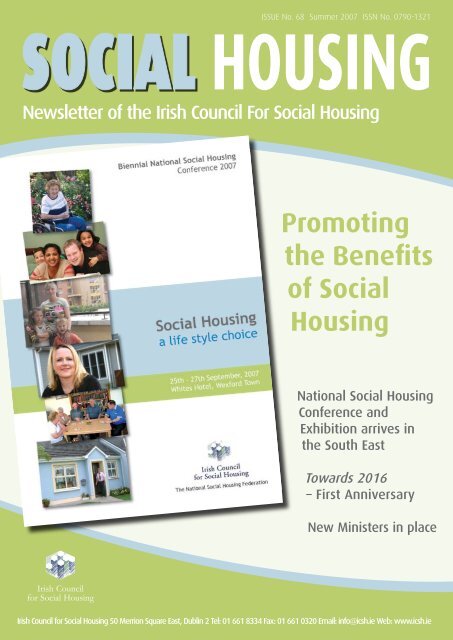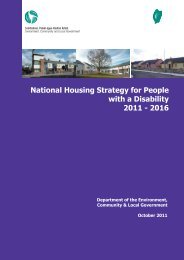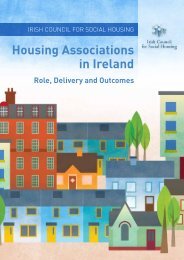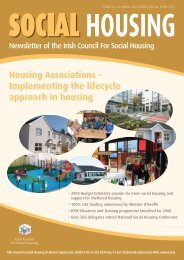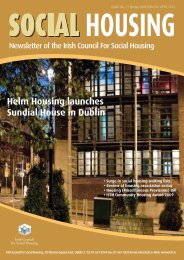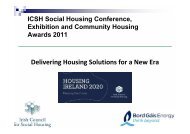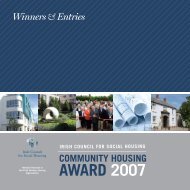Promoting the Benefits of social Housing - The Irish Council for ...
Promoting the Benefits of social Housing - The Irish Council for ...
Promoting the Benefits of social Housing - The Irish Council for ...
Create successful ePaper yourself
Turn your PDF publications into a flip-book with our unique Google optimized e-Paper software.
ISSUE No. 68 Summer 2007 ISSN No. 0790-1321<strong>Housing</strong>Newsletter <strong>of</strong> <strong>the</strong> <strong>Irish</strong> <strong>Council</strong> For Social <strong>Housing</strong><strong>Promoting</strong><strong>the</strong> <strong>Benefits</strong><strong>of</strong> Social<strong>Housing</strong>National Social <strong>Housing</strong>Conference andExhibition arrives in<strong>the</strong> South EastTowards 2016– First AnniversaryNew Ministers in place<strong>Irish</strong> <strong>Council</strong><strong>for</strong> Social <strong>Housing</strong><strong>Irish</strong> <strong>Council</strong> <strong>for</strong> Social <strong>Housing</strong> 50 Merrion Square East, Dublin 2 Tel: 01 661 8334 Fax: 01 661 0320 Email: info@icsh.ie Web: www.icsh.ie
Editorial:Could private sector slowdown provide an opportunity <strong>for</strong> <strong>social</strong> housing?Indications are that private residential construction is slowing down based on <strong>the</strong> number <strong>of</strong> starts and planning permissionsgranted. <strong>The</strong>re<strong>for</strong>e, this surplus capacity should now be transferred to boost <strong>the</strong> delivery <strong>of</strong> <strong>social</strong> housing in <strong>the</strong> new NationalDevelopment Plan (NDP) and in turn meet <strong>the</strong> targets agreed by <strong>the</strong> Social Partners in <strong>the</strong> national agreement Towards 2016.In addition to delivering new <strong>social</strong> rented homes, transferring surplus capacity will ensure better value <strong>for</strong> money in <strong>the</strong> statefunding <strong>of</strong> <strong>social</strong> housing as well as providing a ‘s<strong>of</strong>ter’ landing in <strong>the</strong> residential construction sector. While private housingoutput hit record levels in <strong>the</strong> last NDP, <strong>social</strong> housing output always struggled to creep above 10%. Providing <strong>social</strong> housingthrough housing associations and local authorities has both <strong>the</strong> obvious <strong>social</strong> benefits in addressing housing need but also asignificant economic benefit <strong>for</strong> <strong>the</strong> <strong>Irish</strong> economy.Service Indicators in Local Authorities 2006In January 2004, a system <strong>of</strong> <strong>for</strong>mal per<strong>for</strong>mancemeasurement across 42 indicators was implementedthroughout <strong>the</strong> local authority system. This meant thatper<strong>for</strong>mance results <strong>for</strong> each local authority could becompiled and published in a report to <strong>the</strong> Minister <strong>for</strong> <strong>the</strong>Environment, Heritage and Local Government in 2005. <strong>The</strong>results were verified by an independent assessment panel.This is a first in <strong>Irish</strong> public service.<strong>The</strong> third report was published in July 2007 by <strong>the</strong> LocalGovernment Management Services Board (LGMSB) andcontains <strong>the</strong> results <strong>for</strong> each indicator <strong>for</strong> 2006, <strong>the</strong> reportalso compares results at a national level <strong>for</strong> 2004 to 2006. Asummary <strong>of</strong> <strong>the</strong> main findings is presented below.Total number <strong>of</strong> dwellings <strong>of</strong> local authority stock in managementYearNo <strong>of</strong> Dwellings2004 111,4572005 113,6882006 115,386Current Status <strong>of</strong> Local Authority Social <strong>Housing</strong> Stock<strong>The</strong> national total <strong>of</strong> all local authorities has increased by3.5% in two years. Across all local authorities 5,265 (4.6%)<strong>of</strong> dwellings are empty compared with 3.9% <strong>of</strong> all dwellingsin 2004. Some <strong>of</strong> <strong>the</strong>se empty dwellings are those subjectto major refurbishment schemes which will increase <strong>the</strong>quality <strong>of</strong> <strong>the</strong> housing stock. <strong>The</strong> figures also show a smallimprovement in <strong>the</strong> average time taken to re-let dwellingsfrom 4 weeks in 2004 to 3.8 weeks in 2006. <strong>The</strong>re is also anincrease <strong>of</strong> 3% in <strong>the</strong> average number <strong>of</strong> repairs completedin 2006 relative to 2004. In 2006 <strong>the</strong> average percentage <strong>of</strong>repairs completed was 87.8% <strong>of</strong> <strong>the</strong> number <strong>of</strong> valid repairrequests received.Average time (days) to in<strong>for</strong>mapplicants <strong>of</strong>: 2004 2006Shared Ownership 14 8.7<strong>Housing</strong> Loan 15 8Local Authority <strong>Housing</strong> 28 29.5Dealing with Applications <strong>for</strong> Social <strong>Housing</strong><strong>The</strong> average times taken to in<strong>for</strong>m applicants has marginallyimproved since 2004, with <strong>the</strong> exception <strong>of</strong> <strong>the</strong> time takento in<strong>for</strong>m applicants <strong>of</strong> local authority housing, as can beseen from <strong>the</strong> table below.It is clear from <strong>the</strong>se results that <strong>the</strong> assessment andverification processes vary greatly, moreso in <strong>the</strong> averagetime to in<strong>for</strong>m applicants <strong>of</strong> local authority housing. InFingal County <strong>Council</strong>, <strong>the</strong> average is reported as 270 dayswith <strong>the</strong> explanation that <strong>the</strong>re was a significant increasein <strong>the</strong> housing list in 2006. <strong>The</strong> average time is nowreported as down now to 28 days. Galway County <strong>Council</strong>and Kerry County <strong>Council</strong> reported on average 104.9 and121.3 days respectively.Per<strong>for</strong>mance Management <strong>for</strong> <strong>Housing</strong> AssociationsEnsuring that proper standards continue to be achievedis also a key objective <strong>for</strong> voluntary housing associations.<strong>The</strong> ICSH undertook a two phased pilot project known asHAPM – <strong>Housing</strong> Association Per<strong>for</strong>mance Managementto assist in developing a framework <strong>for</strong> measuringper<strong>for</strong>mance in housing management <strong>for</strong> <strong>the</strong> sector.<strong>The</strong> main areas <strong>of</strong> <strong>the</strong> framework that member housingassociations agreed to measure included <strong>the</strong> followinghousing management functions:• Rent Control• Allocations / Lettings• Vacancies / Voids• Repairs & Maintenance• Landlord / Tenant Relations• Customer Service<strong>The</strong> ICSH are currently examining <strong>the</strong> roll out <strong>of</strong> a refinedHAPM framework comprising <strong>of</strong> 10 Key Per<strong>for</strong>manceIndicators <strong>for</strong> <strong>the</strong> sector. <strong>The</strong>se KPIs are based on thoseelements <strong>of</strong> housing management that are <strong>of</strong> interestto both tenants and o<strong>the</strong>r stakeholders and that provide<strong>the</strong> most appropriate in<strong>for</strong>mation on how well <strong>the</strong>housing service is managed. It is anticipated that, in time,per<strong>for</strong>mance results <strong>for</strong> <strong>the</strong> voluntary sector can alsobe reported on an ongoing basis. <strong>The</strong> objective at somestage would be to gain some comparison on housingmanagement outcomes between local authorities andhousing associations.ICSH Social <strong>Housing</strong>
NEWSClockwise: Caisleian Nua <strong>Housing</strong> Association, Co Tipperary / Cluid <strong>Housing</strong> Association, Foxfrod, Co Mayo / Ballyhaunis Social<strong>Housing</strong> Scheme, Co Mayo“Central to <strong>the</strong> delivery<strong>of</strong> housing projects in<strong>the</strong> voluntary housingsector is <strong>the</strong> acquisitionand assembly <strong>of</strong>building land. ”<strong>The</strong> difficulty with this figure it that it is not clear how <strong>the</strong>level <strong>of</strong> site provision reported in <strong>the</strong> Annual Bulletin translatesinto output. For example, if <strong>the</strong> sites sold in 2006 representedhousing <strong>for</strong> 131 households <strong>the</strong> impact would be limitedhowever if an average <strong>of</strong> 40 units were built on <strong>the</strong> sites <strong>the</strong>nover 5,000 units would be built which is more significant.Central to <strong>the</strong> delivery <strong>of</strong> housing projects in <strong>the</strong> voluntaryhousing sector is <strong>the</strong> acquisition and assembly <strong>of</strong> buildingland. On <strong>the</strong> 14th June 2006, <strong>social</strong> partners signed <strong>the</strong>agreement ‘Towards 2016’where <strong>the</strong>re was a commitment<strong>of</strong> additional land / sites sufficient to support 3,000dwellings to be made available from 2007-2009. An updateon <strong>the</strong> progress <strong>of</strong> ‘Towards 2016’ can be found on page six.end <strong>of</strong> May 2007 this had increased to 2,538 tenants.<strong>The</strong> majority <strong>of</strong> ICSH members have reported a seamlesstransfer <strong>of</strong> tenants with <strong>the</strong> new system operating well.Low cost sites<strong>The</strong> figures from <strong>the</strong> statistics bulletin show that <strong>the</strong>rewere a total <strong>of</strong> 131 sites made available under <strong>the</strong> lowcost site scheme in 2006. <strong>The</strong>se sites can be sold <strong>for</strong> <strong>social</strong>housing delivered by housing associations as well as tohouseholds who would o<strong>the</strong>rwise benefit from <strong>social</strong>housing measures. <strong>The</strong> 2006 figure is disappointing as isrepresents an increase <strong>of</strong> just seven sites on <strong>the</strong> figure <strong>for</strong>2006 (124 sites). This continues <strong>the</strong> trend whereby housingassociations are no longer able to rely on local authorityland banks <strong>for</strong> sites.GrantstownVoluntary<strong>Housing</strong>Association,Co Wex<strong>for</strong>dICSH Social <strong>Housing</strong>
NEWSWork In ProgressTowards 2016 – First AnniversaryICSH Social <strong>Housing</strong>Toward 2016, <strong>the</strong> Social Partnership Agreement sets outGovernment commitments <strong>for</strong> <strong>the</strong> economic and <strong>social</strong>development <strong>of</strong> Ireland <strong>for</strong> <strong>the</strong> next ten years. It was<strong>for</strong>mally signed by all <strong>the</strong> <strong>social</strong> partners on 14th June 2006.It is now over one year on and <strong>the</strong> <strong>Irish</strong> <strong>Council</strong> <strong>for</strong> Social<strong>Housing</strong> as a member <strong>of</strong> <strong>the</strong> Community and VoluntaryPillar has been actively pursuing <strong>the</strong> implementation <strong>of</strong> <strong>the</strong>commitments <strong>of</strong> key importance to <strong>the</strong> voluntary housingsector. This article provides a snapshot <strong>of</strong> what has beenachieved in <strong>the</strong> first year <strong>of</strong> Towards 2016, <strong>the</strong> current ‘workin progress’ and what has yet to be addressed.While it is accepted that Towards2016 is a framework agreementwith a life span <strong>of</strong> ten years <strong>for</strong>implementation, aspects <strong>of</strong> <strong>the</strong>agreement, particularly in relationto housing output targets <strong>for</strong> 2007-2009, require swift, high impactactions from <strong>the</strong> Governmentto enable <strong>the</strong> voluntary andco-operative sector to resolvecurrent blockages.Increasing <strong>the</strong> Supply <strong>of</strong> Social <strong>Housing</strong>In terms <strong>of</strong> output, <strong>the</strong> agreement commits to 73,000additional <strong>social</strong> housing units by 2012, and in <strong>the</strong> shorterterm, a commitment <strong>of</strong> 27,000 units over <strong>the</strong> 3 year periodfrom 2007-2009. For voluntary housing associations specificallythis translates into an additional 1,000 units over <strong>the</strong> sameperiod, bringing <strong>the</strong> annual output to around 2,000 units by<strong>the</strong> sector. In addition, <strong>the</strong> Governmenthas also committed to providing land /sites to housing associations up to <strong>the</strong>equivalent <strong>of</strong> 3,000 dwellings in <strong>the</strong>same time period.Achieving this higher output andincreased availability <strong>of</strong> land will onlybe bolstered by full implementation<strong>of</strong> <strong>the</strong> accompanying commitmentsto streamline <strong>the</strong> capital fundingsystem and active land managementstrategies <strong>for</strong> local authorities. <strong>The</strong>seare key milestones upon which <strong>the</strong>success <strong>of</strong> <strong>the</strong> delivery <strong>of</strong> <strong>the</strong> rest <strong>of</strong> <strong>the</strong>agreement relies upon.“<strong>The</strong> difficultiesand administrativedelays whichhave significantlyinhibited <strong>the</strong>level <strong>of</strong> outputhave been welldocumented by<strong>the</strong> ICSH.”In 2006, local authority outputfell from 4,209 units in 2005to 3,968 units in 2006 andsimilarly, voluntary and co-operative sector output fell from1350 in 2005 to 1,240 in 2006. <strong>The</strong> need <strong>for</strong> state land tobe made available to <strong>the</strong> voluntary and co-operative sectoris a key aspect to increase output. <strong>The</strong> fall in <strong>the</strong> provision<strong>of</strong> state land made available through local authoritiesand o<strong>the</strong>r bodies emphasises <strong>the</strong> need <strong>for</strong> immediateavailability <strong>of</strong> additional land / sites.Progress to date – Access to LandTo date <strong>the</strong> DoEHLG has made some progress in this area.A circular was sent to all local authorities requesting <strong>the</strong>mto identify land which could be made available to <strong>the</strong>sector. <strong>The</strong> target <strong>of</strong> providing building sites <strong>for</strong> housingassociations to deliver 3,000 units was a modest one interms <strong>of</strong> <strong>the</strong> land zoned and available to local authorities.It has been <strong>of</strong>ten overlooked that housing associationshave sourced a significant amount <strong>of</strong> <strong>the</strong>ir own land inrecent years and without that output figures would beeven less. As local authorities are charged as being keyenablers <strong>for</strong> <strong>the</strong> voluntary and co-operative sector <strong>the</strong>acquisition and assembly <strong>of</strong> building land is a perquisite <strong>for</strong>ensuring expansion in housing association output. If <strong>the</strong>reare continued delays in this area, housing associations willnot be able to respond effectively and <strong>the</strong> 2007 and 2008annual targets will not be reached. This will inevitably causea knock-on effect on <strong>the</strong> longer term commitments andtargets in <strong>the</strong> agreement <strong>for</strong> <strong>the</strong> sector.Streamlining <strong>the</strong> Capital FundingSchemes<strong>The</strong> difficulties and administrativedelays which have significantlyinhibited <strong>the</strong> level <strong>of</strong> output have beenwell documented by <strong>the</strong> ICSH. <strong>The</strong>commitment to streamline funding andapproval systems was welcomed andis a key starting point to allow delivery<strong>of</strong> <strong>the</strong> targets in <strong>the</strong> NDP and <strong>the</strong>agreement.Progress on this is ongoing and<strong>the</strong> DoEHLG Voluntary and Cooperative<strong>Housing</strong> Working Grouphave reviewed <strong>the</strong> assessment and
NEWSapproval procedures with <strong>the</strong> objective <strong>of</strong> streamlining<strong>the</strong> assessment appraisal and implementation stages <strong>of</strong>projects. <strong>The</strong> terms <strong>of</strong> <strong>the</strong> capital funding schemes are insome cases over 20 years old and were more applicableto when output was a much lower level.A circular was issued in December 2006 to localauthorities on <strong>the</strong> implications <strong>of</strong> <strong>the</strong> ‘rationalisation’ <strong>of</strong><strong>the</strong> process and currently <strong>the</strong> necessary arrangementsare being put in place <strong>for</strong> <strong>the</strong> introduction <strong>of</strong> newprocedures. <strong>The</strong> ICSH will brief members on <strong>the</strong>se newprocedures ahead <strong>of</strong> <strong>the</strong> roll out.<strong>Housing</strong> and CareAn essential element to <strong>the</strong> success <strong>of</strong> <strong>the</strong> agreement,particularly with <strong>the</strong> introduction <strong>of</strong> <strong>the</strong> Lifecycle approachwill be <strong>the</strong> integration <strong>of</strong> housing with o<strong>the</strong>r key policyareas. Interagency co-operation needs to happen at both apolicy level and service delivery level to impact on housingassociations and <strong>the</strong>ir tenants. With <strong>the</strong> commitment todevelop interagency co-operation where <strong>the</strong>re is a caredimension, progress can be made towards breaking down<strong>the</strong> traditional barriers between different disciplines andachieving a more co-ordinated approach between housingand care.Some progress in this area is that <strong>the</strong> Department <strong>of</strong>Health and Children are now members <strong>of</strong> <strong>the</strong> <strong>Housing</strong>Forum and a cross departmental team on shelteredhousing has recently been established by <strong>the</strong> DoEHLG. <strong>The</strong>slow progress to set up this cross departmental team is notencouraging and <strong>the</strong> ICSH hope that <strong>the</strong> members <strong>of</strong> thiscommittee will work well toge<strong>the</strong>r as it is through <strong>the</strong>semechanisms that cross-disciplinary working i.e. housingand health can translate to <strong>the</strong> local level. <strong>The</strong> voluntaryand co-operative housing sector unlike o<strong>the</strong>r tenures relyheavily on integration between housing and health indelivering services to tenants.O<strong>the</strong>r Key milestones• New statement <strong>of</strong> housing policy Delivering Homes,Sustaining Communities launched in February 2007• Programme <strong>of</strong> investment in <strong>social</strong> housing under <strong>the</strong>NDP E17 billion• National group established to develop a housingstrategy <strong>for</strong> people with a disabilityRespond! <strong>Housing</strong> Association, Blackpool, Co Cork• A green paper on <strong>the</strong> <strong>Housing</strong> Needs Assessment hasbeen produced by <strong>the</strong> Department <strong>of</strong> Environment,Heritage and Local Government• <strong>The</strong> National Homeless Consultative Committee hasbeen established• A number <strong>of</strong> submissions have been receivedregarding minimum standards regulations <strong>for</strong> <strong>the</strong>private rented sector and it is intended that updatedregulations will be drafted by end <strong>of</strong> September 2007• Discussion on streamlining <strong>the</strong> Capital FundingSchemes is continuingIt is clear that a number <strong>of</strong> initiatives remain to becompleted or are significant continuing projects that willneed to be driven on an ongoing basis if <strong>the</strong>y are going tobe achieved in <strong>the</strong> long term.A key element in <strong>the</strong> relevance <strong>of</strong> <strong>the</strong> <strong>social</strong> partnershipagreement will be its measurability and <strong>for</strong> <strong>the</strong> voluntaryhousing sector in particular part <strong>of</strong> <strong>the</strong> focus will be onincreasing output over <strong>the</strong> lifetime <strong>of</strong> <strong>the</strong> agreement. <strong>The</strong>key to delivering on Towards 2016 and to fulfilling <strong>the</strong>targets in <strong>the</strong> NDP is to get <strong>of</strong>f to a good start and establish<strong>the</strong> mechanisms <strong>for</strong> delivery early. Due to <strong>the</strong> factorsoutlined earlier, housing association output has fallen <strong>for</strong>three consecutive years and is currently recovering lostground. Failing to provide <strong>the</strong> tools <strong>for</strong> housing associationsto deliver housing units and housing supports sooner ra<strong>the</strong>rthan later will result in making up this lost ground <strong>for</strong> <strong>the</strong>duration <strong>of</strong> <strong>the</strong> agreement."In terms <strong>of</strong> output, <strong>the</strong> agreement commits to 73,000 additional <strong>social</strong>housing units by 2012, and in <strong>the</strong> shorter term, a commitment <strong>of</strong> 27,000units over <strong>the</strong> 3 year period from 2007-2009."ICSH Social <strong>Housing</strong>
NEWSICSH Annual Regional MeetingsICSH Social <strong>Housing</strong>In June and early July this year, <strong>the</strong> membership <strong>of</strong> <strong>the</strong><strong>Irish</strong> <strong>Council</strong> <strong>for</strong> Social <strong>Housing</strong> came toge<strong>the</strong>r in sevenregional meetings hosted throughout <strong>the</strong> country.A total <strong>of</strong> 250 delegates all ICSH membersattended <strong>the</strong> meetings.<strong>The</strong>y were held to brief members on recentchanges and issues that directly affect <strong>the</strong>m andto give members <strong>the</strong> opportunity to raise localissues. Members also have <strong>the</strong> opportunity tomeet with o<strong>the</strong>r housing associations in <strong>the</strong>irareas and share in<strong>for</strong>mation specific to <strong>the</strong>irregion. Elections <strong>for</strong> ICSH Board Members fromeach region were also held.<strong>The</strong> recent round up <strong>of</strong> meetings looked ata wide range <strong>of</strong> topics including streamliningcurrent procedures in <strong>the</strong> capital funding schemes, <strong>the</strong>impact <strong>of</strong> <strong>the</strong> Rental Accommodation Scheme (RAS) andPart V, governance <strong>for</strong> housing associations, housing andcare issues including <strong>the</strong> defined revenue funding scheme<strong>for</strong> sheltered housing schemes and a pilot CCTV project <strong>for</strong>housing projects <strong>for</strong> older people as well as an update on<strong>the</strong> ICSH Group Insurance Scheme.Dublin & East Regional MeetingOver <strong>the</strong> course <strong>of</strong> <strong>the</strong> regional meetings, ICSH memberswere given <strong>the</strong> opportunity to discuss different aspects <strong>of</strong><strong>the</strong> proposed streamlined approval process and in particularwhat specific implications <strong>the</strong> many new changes had <strong>for</strong>housing associations.Martina Rooney, Development Officer, in her review<strong>of</strong> <strong>the</strong> sector on a regional basis also went through<strong>the</strong> capital funding available to housing associations.Increases in <strong>the</strong> capital funding limits were discussedand <strong>the</strong> ICSH highlighted <strong>the</strong> continuing commitmentfrom <strong>the</strong> Department <strong>of</strong> Environment, Heritage and LocalGovernment (DoEHLG) in developing <strong>the</strong> voluntary and cooperativesector. A number <strong>of</strong> members highlighted <strong>the</strong>need <strong>for</strong> adjustments in <strong>the</strong> funding limits to be applied on“Ef<strong>for</strong>ts <strong>of</strong><strong>Housing</strong>Associationsare beingundermined bypolicies <strong>of</strong> o<strong>the</strong>rGovernmentDepartments”.a more consistent basis to reflect increasing building costs.Some associations felt that <strong>the</strong> increase did not do enoughto alleviate <strong>the</strong> problem <strong>of</strong> high cost <strong>of</strong> land in urban areas.Donal McManus, ICSH Executive Director, tookmembers through a step by step guide to <strong>the</strong>proposed new process <strong>for</strong> streamlining <strong>the</strong>approval and application process <strong>for</strong> housingprojects. This includes proposals to give moredevolved sanctioning powers to local authorities<strong>for</strong> projects up a certain value to appraise <strong>the</strong>project and confirm <strong>the</strong> funding.Raised <strong>for</strong> discussion was <strong>the</strong> plan to facilitate100% CAS funding if housing associationshoused 100% <strong>of</strong> people from <strong>the</strong> localauthority housing waiting list. Some memberswould welcome <strong>the</strong> change, particularly <strong>for</strong> schemes <strong>for</strong>homeless people and people with disabilities. Membershighlighted <strong>the</strong> difficulties small housing associations havein raising <strong>the</strong> 5% contribution, o<strong>the</strong>rs felt that safeguardsneeded to be built in whereby housing associations couldstill opt <strong>for</strong> <strong>the</strong> 5% contribution.Also highlighted were some ongoing issues relatingto housing and care, in particular <strong>the</strong> need <strong>for</strong> greaterclarity in <strong>the</strong> relationship between <strong>the</strong> HSE and <strong>the</strong> LocalAuthorities in terms <strong>of</strong> <strong>the</strong> DoEHLG funded mortgages.Some members are experiencing serious difficulties insecuring rent allowance <strong>for</strong> <strong>the</strong>ir tenants and this, in turn,is threatening <strong>the</strong> viability <strong>of</strong> <strong>the</strong> scheme as <strong>the</strong>re is norental income to <strong>the</strong> housing association.Caren Gallagher, Projects Officer, spoke on <strong>the</strong> governancerequirements <strong>of</strong> housing associations discussing howhousing associations straddle three areas <strong>of</strong> compliancewith <strong>the</strong> Companies Registration Office under <strong>the</strong>ir legalregistration, <strong>the</strong> Revenue Commissioners <strong>for</strong> charitablestatus and <strong>the</strong> Department <strong>of</strong> <strong>the</strong> Environment, Heritageand Local Government in relation to Approved Status. Itwas felt by some Members that <strong>the</strong> huge level <strong>of</strong> workundertaken by voluntary board members across <strong>the</strong> countrySouth Regional Meeting
NEWSto meet all <strong>the</strong> requirements was sometimes not fullyappreciated. One member emphasised that Board Membersare going out <strong>of</strong> <strong>the</strong>ir way to run <strong>the</strong>se schemes across <strong>the</strong>country on a voluntary basis and are meeting <strong>the</strong> needs <strong>of</strong><strong>the</strong> communities, particularly in rural areas with an agingpopulation without being acknowledged and supported to<strong>the</strong> full at a national level.Mid West Regional MeetingMidlands Regional MeetingLinked to this were concerns about a ‘greying <strong>of</strong> <strong>the</strong> board’which is a trend experienced by voluntary organisations as awhole. Members discussed <strong>the</strong> difficulties in recruiting newboard members and running <strong>the</strong> association effectively withlimited time and resources. <strong>The</strong> benefits <strong>of</strong> collaborationamong housing associations were discussed.Border Regional MeetingWest Regional MeetingSouth East Regional MeetingWest Regional Meeting:Pat O’Connor, Roscara <strong>Housing</strong> Association, Dr JerryCowley, Mulranny Day Centre <strong>Housing</strong>, John-Joe Higginsand Seamus Durkin, Peter Triest <strong>Housing</strong> Association.<strong>The</strong> ICSH Board <strong>of</strong> Management was duly elected from <strong>the</strong>regions by <strong>the</strong> membersElected ICSH Board <strong>of</strong> Management fromSeptember AGM 2007BORDER 1 KAREN SMYTHDrogheda Homeless Aid <strong>Housing</strong>AssociationMIDLANDS 2 CHARLES McDONALDSue Ryder FoundationSOUTH-EAST 3 MATTIE McGRATHCaisleán Nua VHA, Co. TipperarySOUTH 4 SR. CELESTINE FARRISSEYCharleville Sheltered <strong>Housing</strong>, Co. CorkDUBLIN/EAST 5 SHARON COSGROVESonas <strong>Housing</strong> Association6 JUSTIN O’BRIENCircle Voluntary <strong>Housing</strong> Association7 SEAN O’CONNORBIH IrelandMID-WEST 8 FRANK GUNTERInagh <strong>Housing</strong> Assoc. Co. ClareWEST 9 DR. JERRY COWLEYLARGE ORGANISATIONS(over 300 units)Mulranny Day Centre <strong>Housing</strong>, Co.Mayo10 DAVID BURKEFocus Ireland11 GENE CLAYTON<strong>The</strong> Iveagh Trust12 JOHN HANNIGANRespond <strong>Housing</strong> Association13 BRIAN O’GORMANClúid <strong>Housing</strong> AssociationICSH Social <strong>Housing</strong>
ICSH NEWSICSH Biennial NationalSocial <strong>Housing</strong> Conference25th – 27th September 2007Social <strong>Housing</strong>: A lifestyle Choice<strong>The</strong> ICSH Biennial Social <strong>Housing</strong> Conference,Social <strong>Housing</strong> - A Lifestyle Choice takesplace from Tuesday 25th to Thursday27th September in WhitesHotel, Wex<strong>for</strong>d Town.<strong>The</strong> <strong>the</strong>me <strong>for</strong> this year’sconference encapsulates<strong>the</strong> Lifecycle approachhighlighting <strong>the</strong> role<strong>social</strong> housing plays insupporting people throughout<strong>the</strong>ir life. <strong>The</strong> <strong>the</strong>me <strong>of</strong> <strong>the</strong> conference is to promote <strong>social</strong>housing as a viable housing option and to explore <strong>the</strong>potential <strong>of</strong> <strong>the</strong> sector to expand <strong>the</strong> range <strong>of</strong> housingoptions available and to integrate housing and o<strong>the</strong>r keypolicies such as health in order to provide homes <strong>for</strong> life.Duncan Stewart"<strong>The</strong> <strong>the</strong>me <strong>for</strong> this year’s conferenceencapsulates <strong>the</strong> Lifecycle approachhighlighting <strong>the</strong> role <strong>social</strong>housing plays in supporting peoplethroughout <strong>the</strong>ir life."Participants at <strong>the</strong> Conference will include <strong>of</strong>ficials andelected Members from local authorities, <strong>of</strong>ficials from<strong>the</strong> HSE, <strong>the</strong> private sector, Government Departments, aswell as staff and Management Board Members <strong>of</strong> housingassociations and co-operatives.<strong>The</strong>re will be a range <strong>of</strong> speakers and contributors from<strong>the</strong> <strong>social</strong> housing sector and Government Departments aswell as o<strong>the</strong>r external guests such as David McWilliams andDuncan Stewart.Parallel Sessions scheduled at <strong>the</strong> Conference include:Session 1: New Migrants and <strong>Housing</strong> ManagementSession 2: Elected Members Role in Delivery <strong>of</strong> Social andAf<strong>for</strong>dable <strong>Housing</strong>Session 3: Innovations in relation to Homelessness including<strong>the</strong> Rental Accommodation Scheme (RAS)Session 4: Supported housing <strong>for</strong> Older People – ToolsRequired to Achieve a Continuum <strong>of</strong> CareICSH Social <strong>Housing</strong>10Mary DavisDavid McWilliamsConference BookingA booking <strong>for</strong>m is contained in <strong>the</strong> ICSHconference brochure which can be obtainedfrom <strong>the</strong> website www.icsh.ie or bycontacting Ca<strong>the</strong>rine McGillycuddy on01 6618334 or ca<strong>the</strong>rine@icsh.ieICSH Annual General Meeting<strong>The</strong> ICSH Annual General Meeting ICSH will this year be held in Wex<strong>for</strong>d in conjunction with <strong>the</strong> National Social <strong>Housing</strong>Conference.<strong>The</strong> AGM has been arranged <strong>for</strong> Tuesday, 25th September from 5.30 to 6.30pm in <strong>the</strong> conference venuewhich is Whites Hotel Wex<strong>for</strong>d. Each currently Affiliated member organisation is entitled to be represented at <strong>the</strong> AnnualGeneral Meeting by two delegates. O<strong>the</strong>r committee and staff members are also welcome to attend.
Launch <strong>of</strong> updated ICSH Website<strong>The</strong> ICSH are pleased to announce <strong>the</strong> launch <strong>of</strong> <strong>the</strong> updated website www.icsh.ie.<strong>The</strong> site was completely re-developed from a purely in<strong>for</strong>mational to a functionalwebsite. <strong>The</strong> new website is more user-friendly and easier to navigate containingmuch more in<strong>for</strong>mation <strong>for</strong> ICSH members to access and download. <strong>The</strong> websiteimproves <strong>the</strong> way in which <strong>the</strong> ICSH can interact with its members and <strong>the</strong> public ingeneral – it also provides an opportunity to showcase <strong>the</strong> sector by featuring photos<strong>of</strong> housing association schemes from across <strong>the</strong> country on <strong>the</strong> home page. As wellas new sections on News and Events, <strong>the</strong>re is also a services section, a recruitmentsection and areas where ICSH publications and policy positions are available.ICSH NEWSPublicationsNew DoEHLG Social <strong>Housing</strong> Design Guidelines<strong>The</strong> Department <strong>of</strong> <strong>the</strong> Environment, Heritageand Local Government has launched its newlyrevised housing design guidelines – Quality<strong>Housing</strong> <strong>for</strong> Sustainable Communities. This newdocument is a revision <strong>of</strong> <strong>the</strong> Social <strong>Housing</strong>Design Guidelines issued in 1999 and had beenanticipated <strong>for</strong> some time. It also updates <strong>the</strong>site selection guidelines. Quality <strong>Housing</strong> <strong>for</strong>Sustainable Communities is intended <strong>for</strong> usein all housing projects and a key aim <strong>of</strong> <strong>the</strong>sebest practice guidelines is to ensure that allnew housing schemes are <strong>social</strong>ly and environmentallysustainable and promote high standards indesign and construction.<strong>Housing</strong> associations should ensure that<strong>the</strong>se new guidelines are used in conjunctionwith <strong>the</strong> Memorandum on <strong>the</strong> Capital FundingSchemes and <strong>the</strong>ir design teams utilise <strong>the</strong>guidelines in project development. Copies<strong>of</strong> <strong>the</strong> guidelines are available to downloadfrom www.environ.ie or can be obtained bycontacting <strong>the</strong> Department <strong>of</strong> <strong>the</strong> Environment,Heritage and Local Government.Photo GalleryClúid <strong>Housing</strong> Association <strong>of</strong>ficially opened its new housingscheme in Fox<strong>for</strong>d, Co Mayo this week. <strong>The</strong> Cathaoirleach,Cllr Seamus Weir <strong>of</strong>ficiated at <strong>the</strong> ceremony and was joinedby Cllr Jim Maloney and Dara Colleary TD.Killeshandra Social <strong>Housing</strong> receiving <strong>the</strong> Local AuthorityMembers Award <strong>for</strong> Best Af<strong>for</strong>dable <strong>Housing</strong> Developmentearlier this year.ICSH Social <strong>Housing</strong>11
news<strong>Housing</strong> OverseasICSH Social <strong>Housing</strong>12EnglandBuilding capacity could be limitedbecause <strong>of</strong> OlympicsA recent reportby constructionconsultants in<strong>the</strong> UK has foundthat Olympics in 2012 will inflateconstruction prices by more than 6%per year on <strong>the</strong> run up to <strong>the</strong> Olympics.It is estimated that price increaseswill be in <strong>the</strong> region <strong>of</strong> 6.3-6.5%. <strong>The</strong>concern from a housing perspective isthat this could jeopardise <strong>the</strong> targets<strong>for</strong> new homes that <strong>the</strong> Governmenthas set. It is felt that if <strong>the</strong> work on<strong>the</strong> Olympics starts to slip behind<strong>the</strong>n <strong>the</strong>re could be a push to haveconstruction completed on all <strong>the</strong>construction projects that are part <strong>of</strong><strong>the</strong> Olympics. Reducing <strong>the</strong> supply<strong>of</strong> contractors working on providingaf<strong>for</strong>dable homes is currently one<strong>of</strong> <strong>the</strong> concerns and procurementinitiatives are being developed tocounteract this.CanadaIncome related rents in <strong>social</strong> housingsector OttawaIn <strong>the</strong> City <strong>of</strong> Ottawa <strong>the</strong>re are currentlyalmost 23,000 <strong>social</strong> housing unitsmanaged by 56 independent non-pr<strong>of</strong>ithousing associations which operatethroughout <strong>the</strong> City <strong>of</strong> Ottawa. Rentsin <strong>the</strong> <strong>social</strong> housing sector are setaccording to <strong>the</strong> income <strong>of</strong> <strong>the</strong> tenant.Tenants do not pay more than 30% <strong>of</strong><strong>the</strong>ir income towards rent. Currently<strong>the</strong>re over 1 million people who live in<strong>the</strong> Ottawa Metropolitan area.AustriaVienna demonstrates benefit <strong>of</strong>large <strong>social</strong> housing stockVienna which has proud history <strong>of</strong><strong>social</strong> housing provision has nowone <strong>of</strong> <strong>the</strong> largest <strong>social</strong> housingstocks in <strong>the</strong> EU. In Austria <strong>the</strong>reare about 200 non-pr<strong>of</strong>it housingassociations and in Vienna nonpr<strong>of</strong>ithousing associations managearound 136,000 homes. Dueto <strong>the</strong> scale <strong>of</strong> <strong>social</strong> housing,waiting times <strong>for</strong> <strong>social</strong> housingcan be around 6 months <strong>for</strong> veryhigh demand areas but as littleas a month or less <strong>for</strong> reletting inmany areas. Subsidized housing inVienna costs in <strong>the</strong> region <strong>of</strong> €5-6per metre per month. In order toachieve balanced neighbourhoods inVienna new housing areas have tocomprise <strong>of</strong> apartments <strong>of</strong> differentcosts as well as a mix <strong>of</strong> tenures<strong>of</strong> rental and homeownership. <strong>The</strong>City <strong>of</strong> Vienna as part <strong>of</strong> <strong>the</strong> e-Government strategy will enabletenants to carry out all <strong>the</strong>ir housingmanagement functions on line.Some <strong>of</strong> <strong>the</strong> most innovative <strong>social</strong>housing projects from new build,refurbishment and redevelopment<strong>of</strong> brown field sites exist in Vienna.BulgariaEnergy consumption problem inBulgariaIn <strong>the</strong> new EU Member State over 95%<strong>of</strong> all households are homeownerswhich is higher than its near neighbourRomania and higher also than <strong>the</strong> oldEU 15 where Ireland and Spain had <strong>the</strong>highest levels <strong>of</strong> owner occupation.A significant number <strong>of</strong> householdshave become homeowners following<strong>the</strong> recent privatization <strong>of</strong> <strong>the</strong> <strong>social</strong>housing sector <strong>for</strong> low-income andvulnerable groups. Dwellings inBulgaria also comprise <strong>of</strong> a highpercentage <strong>of</strong> concrete panel dwellingsincluding those build in <strong>the</strong> highdemand areas such as S<strong>of</strong>ia between<strong>the</strong> 1960’s and 1990’s. Problems withpoor insulation on external walls andwindows are some <strong>of</strong> <strong>the</strong> legacy <strong>of</strong>this problem.Vienna, Austria<strong>Irish</strong> <strong>Council</strong> <strong>for</strong> Social <strong>Housing</strong>50 Merrion Square East, Dublin 2Tel: 01 661 8334Fax: 01 661 0320Email: info@icsh.ieWeb: www.icsh.ie


